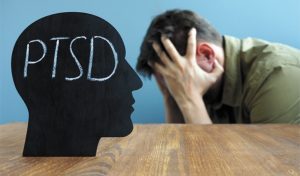 Post-traumatic stress disorder (PTSD) is a mental health condition that can develop after a person experiences or witnesses a terrifying event. Symptoms may include flashbacks, nightmares, severe anxiety, and uncontrollable thoughts about the traumatic event. PTSD can be debilitating, significantly impacting a person’s ability to function in daily life.
Post-traumatic stress disorder (PTSD) is a mental health condition that can develop after a person experiences or witnesses a terrifying event. Symptoms may include flashbacks, nightmares, severe anxiety, and uncontrollable thoughts about the traumatic event. PTSD can be debilitating, significantly impacting a person’s ability to function in daily life.
The most common treatments for PTSD are psychotherapy and medication. However, many individuals struggle to find relief with these conventional methods. This has led researchers to explore alternative treatments, including the use of cannabidiol (CBD), a non-psychoactive compound found in the cannabis plant.
What is PTSD?
PTSD is a disorder that can occur after experiencing or witnessing a traumatic event such as a natural disaster, serious accident, combat, sexual assault, or other forms of violence and abuse. Symptoms of PTSD can include:
. Re-experiencing the traumatic event through flashbacks, nightmares, or intrusive thoughts
. Avoidance of people, places, or things that remind the person of the traumatic event
. Negative changes in thoughts and mood, including feelings of guilt, detachment, or loss of interest
. Hyperarousal, which can manifest as irritability, aggression, difficulty sleeping, or being easily startled
PTSD can be incredibly distressing and disruptive to daily life. If left untreated, it can lead to other mental health issues such as depression, substance abuse, and even suicidal ideation.
CBD and PTSD
CBD has gained attention in recent years for its potential therapeutic benefits in various areas, including anxiety, pain management, and sleep disorders – all of which are common symptoms associated with PTSD.
While research on the use of CBD for PTSD is still in its early stages, some studies have shown promising results. One study published in the Journal of Alternative and Complementary Medicine in 2019 found that CBD was associated with a significant reduction in PTSD symptom severity among a group of adults with PTSD.
Another study published in the Journal of Neuroscience Research in 2021 examined the use of CBD in treating PTSD-related nightmares and found that CBD was effective in reducing the frequency and intensity of nightmares.
It’s important to note that these studies were relatively small, and more research is needed to fully understand the potential benefits and optimal dosages of CBD for PTSD treatment.
How CBD May Help with PTSD Symptoms
CBD is believed to interact with the body’s endocannabinoid system, which plays a role in regulating various physiological processes, including mood, sleep, and stress response. By modulating the endocannabinoid system, CBD may help alleviate PTSD symptoms in the following ways:
1. Reducing anxiety and stress: CBD has been shown to have anxiolytic (anti-anxiety) properties, which could help alleviate the heightened anxiety and stress levels associated with PTSD.
2. Improving sleep: Many individuals with PTSD struggle with sleep disturbances, such as insomnia and nightmares. CBD may help improve sleep quality by reducing anxiety and promoting relaxation.
3. Modulating fear and trauma responses: CBD may help modulate the fear and trauma responses associated with PTSD by interacting with the brain regions involved in memory processing and emotional regulation.
While CBD shows promise as a potential treatment for PTSD, it’s important to note that it should not be considered a cure-all solution. It’s best to use CBD in conjunction with therapy, counseling and other natural treatments. Patients should never stop medications without talking to your doctor first.
If you or someone you know is struggling with PTSD, it’s essential to seek professional help. With the right combination of treatments, including the potential use of CBD, it is possible to manage PTSD symptoms and improve overall quality of life.
Download our free CBD guide which can also help answer many questions you may have about this amazing plant medicine and if it may be an optional therapy for you.
Did you know?
Post-traumatic stress disorder (PTSD) is a risk factor for suicide, especially in women. Some studies have found that:
• Women with PTSD: Are almost seven times more likely to die by suicide than other women
• Men with PTSD: Are four times more likely to die by suicide than men without PTSD
• Suicide rates: Increase to 53.9 per 100,000 person years for people with PTSD, compared to 12.9 for the entire study sample
• Average time between diagnosis and suicide: Is less than two and a half years
Bannerharvest.com
(352) 350-0200
426 N 3rd St., Leesburg, FL 34748
(352) 661-7650
1212 S Main St, Wildwood, FL 34785
References:
https://www.ncbi.nlm.nih.gov/pmc/articles/PMC6482919/
https://www.ncbi.nlm.nih.gov/pmc/articles/PMC7758737/
 Central Florida Health and Wellness Magazine Health and Wellness Articles of the Villages
Central Florida Health and Wellness Magazine Health and Wellness Articles of the Villages



